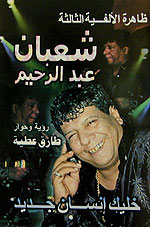|
|
register now
for site updates
(type your email here)
|
|
|
|
|
|
|
|
|
|
|
|

|
|
|
|
|
|
|
|

|
Shaaban against Israel
By Amira Howeidy
The singer as society's fun-house mirror
"Did you hear Shaaban Abdel-Rehim?"
"Have you heard 'Ana bakrah Israel' (I hate Israel)?"
These have become regular questions people ask each other these days.
At least three people at work showed up last week with 'Mate'darsh' (You can't), Shaaban Abdel-Rehim's new album which is selling like hot cakes, mainly because of the Ana bakrah Israel song. As one colleague played the tape and Shaaban began shouting, "I hate Israel and I'll say so if I'm asked even if it costs me my life or I get arrested," the office started cheering. Those who kept quiet were actually just listening carefully in an attempt to decipher the lyrics. Once they understood the words, they either started grinning or suddenly exploded in surprised laughter.
That's the typical reaction to Shaaban's songs, which have been blaring from small kiosks on street corners, in music shops, and out of cars driving by. Suddenly, this illiterate (literally), crude ironer whose voice I don't find particularly attractive has become the hot topic of discussion in Cairo.
Not only is everyone buying his two most popular albums 'Mate'darsh" and 'Mabat-hadedsh' (You can't threaten me), the press has also shown a huge amount of interest in the "phenomenon" known as Shaaban Abdel-Rehim. He's been dubbed the icon of contemporary popular music, for better or worse. Intellectuals argue that Shaaban reflects the "pulse of the man in the street". Many actually believe that his popular song 'Habatal el-sagayaer' (I'll quit smoking) made more of an impact on smokers than government anti-smoking campaigns.
In the absence of reliable statistics, this claim can never be verified, but the mere fact that it was made is very telling of Shaaban's importance, and inspired me to buy his tapes (despite my dislike of his voice) in an attempt to discover where all this power comes from.
Ana Bakrah Israel met my expectations. As I listened, I couldn't help grinning just like my colleagues in the office. To my knowledge, this is the first song that demonstrates such boldness in displaying popular sentiment towards Israel. Shaaban reiterates the statement "I hate Israel" again and again, as casually as one does with an undisputed fact. There is no question that Israel is the enemy for the vast majority of Egyptians -- as are the Arabs to Israel -- but never before was it expressed so forcefully or bluntly.
The rest of the song includes lines like "I love Hosni Mubarak because of his broad mind", and "I hate Ehud Baraků I love Amr Moussa."
The first time I heard Shaaban sing the line, "I hate Israel and I'll say so if you asked me, even if that gets me killed or arrested," the word "arrested" made me stop and think. Whether he knows it or not, Shaaban is making a latent acknowledgment of the fact that prison might always be the fate of those who express views that run contrary to those of the government.
But politics aside, everyone seems to believe that by summer, Shaaban will be the hottest singer in town, despite -- or maybe because of -- the fact that some see only shallowness and vulgarity in his songs, while other feel his lyrics are inspired from their daily lives and the issues that matter to them.
Commenting on a song performed by Shaaban's son, Essam, one newspaper vendor told me that the words are "just so real because he says things like 'I want to live, climb the ladder and dress in silk', and who doesn't? To me, this is more realistic than all the emotional crap all the others are going on about."
Meanwhile, for those who can afford to live a good life and dress in silk, Shaaban is simply a good laugh.
Both are listening to the same man yet decipher him differently.
A hero? A comedian?
I believe he's both. Shaaban is a manifestation of our de facto politicized nature, and our submissiveness to the reality of poverty and a lack of democracy. He symbolizes the amazing way we manage to live with it all, without being able to change for the better. And all the while, we laugh at this reality, the same way we laugh both at and with Sha'aban Abdel-Rehim, whole-heartedly.

Click here to find out more about Shaaban Abdel-Rehim, Zahirat Al-Alfiya Al-Talta: Khaleek Insan Gideed (Shaaban Abdel-Rehim, Phenomenon of the Third Millennium: Re-Invent Yourself),
a brand new book by Tarek Atia
tracing the rise of Shaaban Abdel-Rehim
and what his success means for the Arabic music scene.
Did you like this article? Send your comments to comments@cairolive.com
|
|
|